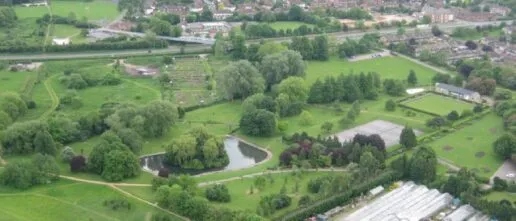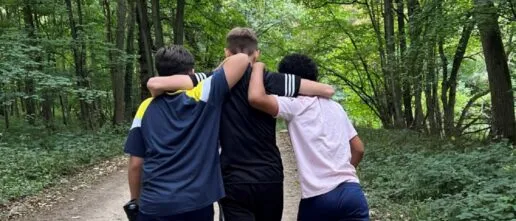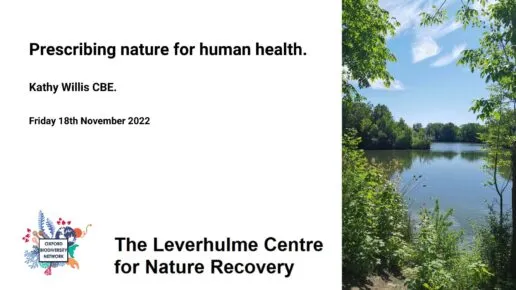About
Nature recovery is embedded in a wider socio-economic context which includes both its direct and often beneficial impacts on both physical and mental human wellbeing. In this theme we examine which specific aspects of nature recovery are needed in order to maximize the benefits that nature can provide to human health and wellbeing.
A rapidly growing literature shows that physical and mental health is greatly improved by access to green space. However, a significant knowledge gap remains: which aspects of nature are responsible for the association between green space and health? To what extent is it a combination of vegetation shapes, colours, sounds such as elevated songbird and reduced traffic noise, density of biomass, or even the smell emitted by different plant volatile organic compounds? A plethora of studies have been published in the past decade on these various aspects of nature that all trigger physiological and psychological responses when we interact with them but usually these are studies carried out in a clinical setting with a small number of participants. This new theme aims to move these experiments into real-life situations with randomised control trials (RCTs) to tease apart which aspects of nature align most closely with aspects of enhanced physical and mental human well-being. Specifically, a new set of new methodological approaches are being developed that links ecology and neurosciences and NGOs working in this space across Oxford, to understand the exact mechanisms involved, providing novel and quantitative understanding of exactly what types of natural landscape provide most benefits to mental health and well-being.
In addition to field experiment experiments and clinical trials we will be using new big-data approaches that harvest social media to provide novel understanding of how people interact with and benefit from nature. In this theme we aim to develop novel and quantified estimates of the health and wellbeing aspects of nature and use this information to design nature recovery strategies that also maximise its health benefits.
Related Projects

Nature for student’s life: The impact of outdoor greenness on mental wellbeing and chronic absenteeism
Does greenness matter to student mental wellbeing and attendance

Oxford Policy Engagement Fellowship: Developing a green infrastructure equity tool
A collaborative project with Plymouth City Council and the Woodland Trust to develop and trial a tool to identify neighbourhoods that are socioeconomically deprived and lack access to green space.

From greening to wellbeing: Multi-scale analysis of green infrastructure and mental health at population level within the UK
A mixed methods investigation into how green infrastructure influences mental health across diverse communities and landscapes in the UK

Equitable distribution of nature-rich accessible green space: An Oxfordshire case study
Investigating the distribution of freely accessible green space in Oxfordshire in relation to socio-economic status to inform local green space planning.

Potential for Collaboration with Green Health Initiatives in Oxfordshire
Scoping the opportunities for engagement and collaboration with NGOs working in the green health space.

The role of volatile organic compounds in physical and mental wellbeing outcomes
Determining the mechanism through which volatile organic compounds released by plants can influence our physical and mental wellbeing.

An investigation into the impact of different measures of vegetation cover and characteristics in urban areas on mental health in Birmingham
This was a desk-based project using the exceptional tree-data and greenspace data sets from Birmingham City along with the Small Area Mental Health Index to determine which aspect of nature are associated with the most positive mental health outcomes.

Urban green space, values and wellbeing in urban Ghana
Exploring how urban green space is (dis)valued in Accra and Kumasi, and the potential (dis)benefits to subjective wellbeing

Is “Nature” a Policy Solution to Mental Health in Schools?
The aim of this Sprint is to provide evidence to support or challenge the value of Nature-based Programmes for mental health and wellbeing in young people, delivered through schools.
Flourishing & Wellbeing
Investigating how non-clinical environments might be utilised to enhance public health and mental health

Engaging schools with nature
How can we engage secondary schools and teenagers with nature?
Related Outputs
From Greening to Wellbeing
From greening to wellbeing: Spatial and social-economic disparities in School outdoor greenness and the impact on mental wellbeing and school attendance in children and adolescents. Wendee gave a presentation to the Healthy Ecosystem Restoration in Oxfordshire (HERO) Network on 9/4/2025 about her research.
Oxfordshire’s greenspace-deprived neighbourhoods
A new report which has just been launched explores Natural England’s Green Infrastructure data to identify neighbourhoods in Oxfordshire experiencing both socio-economic deprivation and poor provision of accessible greenspace, with a view to these neighbourhoods being prioritised in terms of planning, allocation of funding, and effort for improving quality and quantity of accessible greenspace.
Oxfordshire’s greenspace-deprived neighbourhoods
Coordinating author: Martha Crockatt This report explores Natural England’s Green Infrastructure data to identify neighbourhoods in Oxfordshire experiencing both socio-economic deprivation and poor provision of accessible greenspace, with a view to these neighbourhoods being prioritised in terms of planning, allocation of funding, and effort for improving quality and quantity of accessible greenspace. Contributors: Matt Witney […]
Nature Seminar Series. Prescribing nature for human health Kathy Willis
In this talk Kathy will present an overview of studies examining evidence for the interactions with nature that bring about hormonal responses and changes to nervous and immune systems that induce physiological and psychological calming, pain relief and alleviation of tiredness. The Leverhulme Centre for Nature Recovery and Biodiversity Network are interested in promoting a wide […]
Oxford Nature Conversations Project Citizens’ Jury on People & Nature
In February 2025, Oxford Nature Conversations brought together 15 residents to collaboratively envision a future where both people and nature can thrive in Oxford. Over the course of four deliberative workshop days, participants engaged in structured discussions, expert presentations, and collaborative exercises to explore environmental challenges and opportunities in the city. This inclusive process resulted […]
Priorities for Healthy Ecosystem Restoration in Oxfordshire
What are the key challenges to nature recovery across Oxfordshire? How can the University work alongside local partners with the aim of making Oxfordshire a model county for nature recovery? What are the priorities where HERO can contribute on a three-year timescale, and what should be the priority for the first year?



